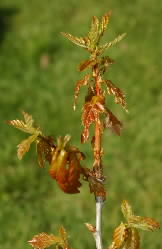Summary
Developing sustainable management to balance the economic, ecological and social roles of woodlands in south east England and north east France
This four-year project involved a partnership of research organisations and local authorities from northern France and southern England, two regions with similar production and semi-natural forest ecosystems. Forest Research helped to develop common management strategies to maximise the economic, environmental and social benefits from forests in the two regions and to improve their resilience to climate change.
Objectives of the management of multifunctional forests (MULTIFOR) project
Overall objective
The main aim of the project was to develop a joint cross-border strategy for understanding the climate change responses, multifunctional value and adaptation capacity of forest ecosystems commonly found in the south of England and north east of France.
Specific objectives
As part of this broad aim there are six specific objectives:
- Improving our knowledge and understanding of the impact of climate change on forests by studying changes in the different aspects of the forest ecosystem, including biodiversity, phenological (life-cycle timing) responses and tree growth.
- Adapting forest management to this changing context by concrete action and raising the awareness of landowners, forestry managers and the wider public by setting up demonstration plots and devising information and awareness-raising tools aimed at landowners, forestry managers and the wider public.
- To educate children and the wider public about the forest by opening private forests to them and creating joint educational tools.
- Improving our understanding of how to reconcile the socio-economic activities of the forest with the protection of nature.
- Promoting the development of wood energy by setting up pilot sites and the creation of joint tools for the buyers and suppliers of wood energy.
- Improving the physical links between forested areas by promoting reforestation between existing woodlands in the regions concerned.
The associated activities was undertaken jointly through shared organisational networks on either side of the Channel.
Forest Research involvement in the management of multifunctional forests (MULTIFOR) project

Forest Research was involved in the components of the project that were concerned with:
- Assessing the influence of climate change on forest ecosystems
- Investigating the mechanisms for improving forest ecosystem resilience to climate change.
This was achieved by:
- Selecting and surveying forest plots on contrasting soil types across the south-east of England to study:
- Patterns in tree growth rings using dendroclimatology techniques
- The diversity of woodland birds and ground vegetation
- The timing of tree seasonal cycles (spring leafing, autumn leaf fall) – see sequence of images above showing opening of oak buds
- The effectiveness of novel biodiversity indicator methods.
 The above were compared with surveys in similar French plots, as a ‘transect’ of woodland stands along a climatic gradient.
The above were compared with surveys in similar French plots, as a ‘transect’ of woodland stands along a climatic gradient. - Using climate-matching and climate analogue approaches to identify potential ‘climate-change proofed’ provenance material and to test predictive growth models using real growth data from French and English sites in the region across climate and soil gradients.
- Testing the germination ability of seed from local and more southerly provenance sources across a range of current and projected temperatures.
- Assisting in the establishment of demonstration ‘climate change plots’ with a range of provenance material and species in both countries as foci for engagement with foresters, the public and for educational purposes.
Findings and Recommendations
- Strategic plan to optimise management at 35 privately owned sites in Kent and East Sussex to meet ecological, social and economic objectives
- Annual phenological observations at sites in the UK and France to monitor tree health and compare climate change responses and adaptation on either side of the Channel
- Tree provenance planting trial – beech seeds from trees in Picardie were planted in northern France
- Comparison of biodiversity assessment methodologies and testing of the Potential Biodiversity Index (PBI)
- Experimental plot matching between sites in France and England to evaluate different adaptive forest management strategies
- School exchange between Forest Schools in Kent and primary schools in Pas de Calais
- Joint action plan to develop the wood fuel sector in England and France
- Actions to improve forest connectivity using GIS, ecological and archaeological surveys and by large-scale hedge planting
- Opening of suitable private sites to the public on both sides of the Channel
Our Involvement
Working with other partners, the Forest Research team selected and surveyed forest plots on contrasting soil types across the south-east of England, observing patterns in tree ring growth, plant and bird diversity and the timing of seasonal cycles (leafing, budding, autumn leaf fall). Forest Research sites provided ‘climate change plots’ in experiments to test the ability of seeds collected from trees in southern France to germinate and grow across a range of different climate conditions.
General Content
Partners
- Le Centre Régional de la Propriété Forestière Nord Pas-de-Calais Picardie
- La Maison du bois (The Federation of Municipalities of Canche and Authie Valleys)
- PEFC Nord Picardie (Programme for the endorsement of forest certification – Nord Picardie)
- L’Office National des Forêts (ONF) (French Forestry Office)
- Kent Downs AONB Unit, Kent County Council
- Essex County Council
- High Weald AONB Unit, East Sussex County Council
External websites
Funding & Partners
-
 European Regional Development Fund through the Interreg IVA 2 Seas Cross-border Cooperation Programme 2007-2013 (50%)
European Regional Development Fund through the Interreg IVA 2 Seas Cross-border Cooperation Programme 2007-2013 (50%) -
 Forestry Commission (50%)
Forestry Commission (50%)
